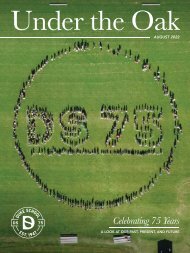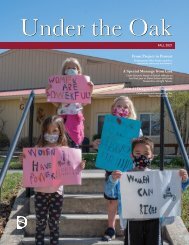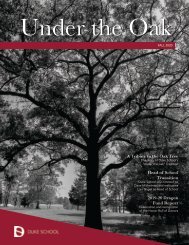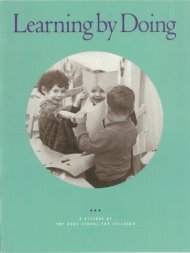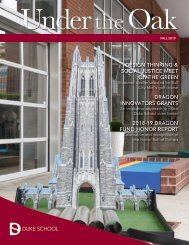Create successful ePaper yourself
Turn your PDF publications into a flip-book with our unique Google optimized e-Paper software.
A. To create <strong>the</strong> physical animation for <strong>the</strong><br />
TED-ED video, I worked with Katie Christo, <strong>the</strong><br />
director of technology curriculum and innovation,<br />
to create a stop motion animation, drawn on a<br />
white board. Though it was a bit of a risk for my<br />
prior experience, it was extremely rewarding. The<br />
animation is not a fluid video, but a collection<br />
of approximately 1,500 photos, taken over <strong>the</strong><br />
course of seven hours at my kitchen table. The<br />
process was an enormous learning opportunity<br />
that I was only able to complete with <strong>the</strong> help<br />
of incredible teachers and <strong>the</strong> patience of my<br />
parents as our kitchen table turned into a tech<br />
studio for a weekend.<br />
Q. You were <strong>the</strong> only student to complete<br />
and share your video publicly at <strong>Duke</strong> <strong>School</strong>.<br />
Your video sparked a lot of interest on social<br />
media amongst <strong>Duke</strong> <strong>School</strong> students, parents,<br />
administrators, and even <strong>the</strong> TED-Ed team! What<br />
did it mean to you to be able to share your<br />
research with o<strong>the</strong>rs?<br />
A. I remember, a little while ago, someone<br />
asking me why astrobiology mattered. Sure,<br />
it could be interesting, but similar to a topic<br />
like quantum mechanics, it can also become<br />
tiresome if you are not a physicist with multiple<br />
degrees and an incredible attention span. Why<br />
should a person with no personal affiliation care<br />
deeply about astrobiology? I found this question<br />
fascinating, and quite legitimate at that. Truthfully,<br />
it’s hard for me to say why I find <strong>the</strong> search for life<br />
beyond ourselves so dazzling — why I feel that<br />
<strong>the</strong> answers to it all will illuminate human origins,<br />
that we are not separate, but a part of this wider<br />
world. To truly understand your connection to all<br />
of it, astrobiology must be experienced, not told.<br />
But I tried my best to answer <strong>the</strong> question. Since<br />
<strong>the</strong> human species had even <strong>the</strong> slightest idea<br />
of how to make sense of it all, we have looked<br />
for life beyond ourselves. It is not that Europa is<br />
simply a passion of mine, it is that Europa is part<br />
of something bigger, something timeless and<br />
universally true. Europa is one part of trying to<br />
find something bigger than ourselves. To truly<br />
understand what it means to be human, we<br />
must realize our unthinkable insignificance within<br />
<strong>the</strong> cosmos, an insignificance so huge it cannot<br />
be contemplated, but an insignificant just as<br />
beautiful because of what we are part of. Sharing<br />
my TED-Ed video with o<strong>the</strong>rs meant that maybe<br />
some small piece of this would unearth itself, and<br />
maybe change people in <strong>the</strong> process.<br />
Q. Will you continue to be a part of <strong>Duke</strong><br />
<strong>School</strong>’s TED-Ed club? If so, do you have an idea<br />
of what you’ll like to explore next?<br />
A. The TED-Ed club experience at <strong>Duke</strong><br />
<strong>School</strong> was an incredible one. With <strong>the</strong> support<br />
of wonderful teachers and an idea, I was able<br />
to create something that represents me and my<br />
passions, and this gave me <strong>the</strong> ability to unleash<br />
this upon <strong>the</strong> world and community around me.<br />
I continue to attempt study of <strong>the</strong> cosmos, and I<br />
have upcoming projects focused on connections<br />
between hydro<strong>the</strong>rmal ecosystems on Earth<br />
and possible habitable areas on Europa and<br />
Enceladus, a moon of Saturn. I hope to continue<br />
using <strong>the</strong> TED structure and ideas in my research,<br />
and to share my passions with o<strong>the</strong>rs, providing<br />
our beautiful insignificance within <strong>the</strong> cosmos. I<br />
can’t wait to see where it takes me!<br />
UNDER THE OAK<br />
13




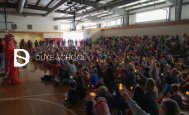
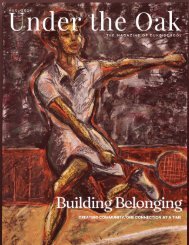
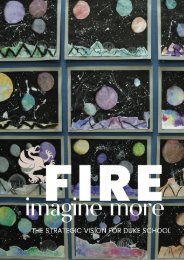
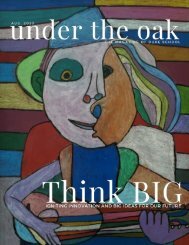
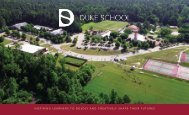

![Under the Oak 2023 [FINAL5] (1)](https://img.yumpu.com/68405392/1/190x245/under-the-oak-2023-final5-1.jpg?quality=85)

